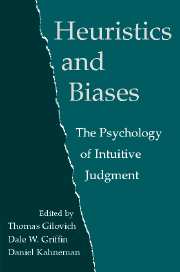Book contents
- Frontmatter
- Contents
- List of Contributors
- Preface
- Introduction – Heuristics and Biases: Then and Now
- PART ONE THEORETICAL AND EMPIRICAL EXTENSIONS
- PART TWO NEW THEORETICAL DIRECTIONS
- PART THREE REAL-WORLD APPLICATIONS
- 33 The Hot Hand in Basketball: On the Misperception of Random Sequences
- 34 Like Goes with Like: The Role of Representativeness in Erroneous and Pseudo-Scientific Beliefs
- 35 When Less Is More: Counterfactual Thinking and Satisfaction among Olympic Medalists
- 36 Understanding Misunderstanding: Social Psychological Perspectives
- 37 Assessing Uncertainty in Physical Constants
- 38 Do Analysts Overreact?
- 39 The Calibration of Expert Judgment: Heuristics and Biases Beyond the Laboratory
- 40 Clinical versus Actuarial Judgment
- 41 Heuristics and Biases in Application
- 42 Theory-Driven Reasoning about Plausible Pasts and Probable Futures in World Politics
- References
- Index
35 - When Less Is More: Counterfactual Thinking and Satisfaction among Olympic Medalists
from PART THREE - REAL-WORLD APPLICATIONS
Published online by Cambridge University Press: 05 June 2012
- Frontmatter
- Contents
- List of Contributors
- Preface
- Introduction – Heuristics and Biases: Then and Now
- PART ONE THEORETICAL AND EMPIRICAL EXTENSIONS
- PART TWO NEW THEORETICAL DIRECTIONS
- PART THREE REAL-WORLD APPLICATIONS
- 33 The Hot Hand in Basketball: On the Misperception of Random Sequences
- 34 Like Goes with Like: The Role of Representativeness in Erroneous and Pseudo-Scientific Beliefs
- 35 When Less Is More: Counterfactual Thinking and Satisfaction among Olympic Medalists
- 36 Understanding Misunderstanding: Social Psychological Perspectives
- 37 Assessing Uncertainty in Physical Constants
- 38 Do Analysts Overreact?
- 39 The Calibration of Expert Judgment: Heuristics and Biases Beyond the Laboratory
- 40 Clinical versus Actuarial Judgment
- 41 Heuristics and Biases in Application
- 42 Theory-Driven Reasoning about Plausible Pasts and Probable Futures in World Politics
- References
- Index
Summary
So, we have the paradox of a man shamed to death because he is only the second pugilist or the second oarsman in the world. That he is able to beat the whole population of the globe minus one is nothing; he has “pitted” himself to beat that one; and as long as he doesn't do that nothing else counts.
William James, 1892, p. 186James's observation represents an early statement of a fundamental principle of psychology: A person's objective achievements often matter less than how those accomplishments are subjectively construed. Being one of the best in the world can mean little if it is coded not as a triumph over many, but as a loss to one. Being second best may not be as gratifying as perhaps it should.
Since James's time, of course, this idea has been both theoretically enriched and extensively documented. Social psychologists have shown that people's satisfaction with their objective circumstances is greatly affected by how their own circumstances compare with those of relevant others (Festinger, 1954; Suls & Miller, 1977; Taylor & Lobel, 1989). A 5% merit raise can be quite exhilarating until one learns that the person down the hall received an 8% increase. Psychologists have also demonstrated that satisfaction with an outcome likewise depends on how it compares with a person's original expectations (Atkinson, 1964; Feather, 1967, 1969). Someone who receives a 5% raise might be happier than someone who receives an 8% increase if the former expected less than the latter.
- Type
- Chapter
- Information
- Heuristics and BiasesThe Psychology of Intuitive Judgment, pp. 625 - 635Publisher: Cambridge University PressPrint publication year: 2002
- 1
- Cited by



